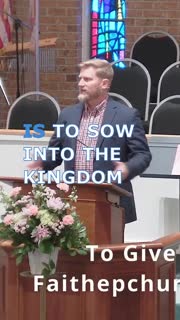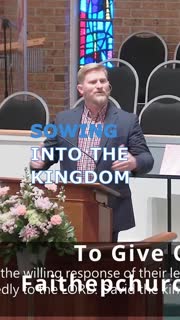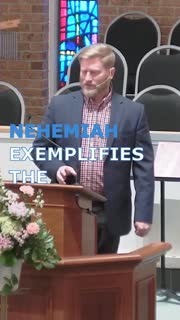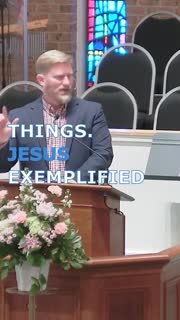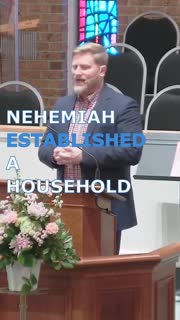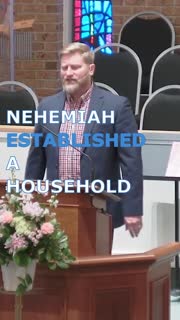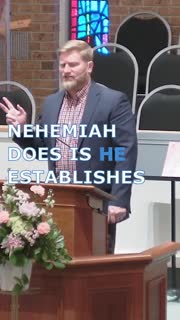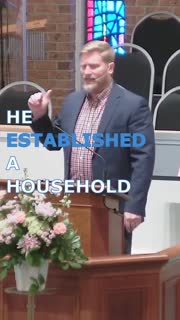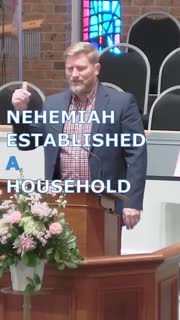Godly Leadership: Guiding Families and Communities in Faith
Devotional
Sermon Summary
Bible Study Guide
Sermon Clips
### Quotes for Outreach
1. "We pray that as they go to school to go to college that they can be a light in the darkness, that they can speak forth your word, that they can be leaders for your gospel and not followers of the world that's out there." [31:34]
2. "What a beautiful thing it is to sow into the kingdom of God. I'm going to invite our second grade and younger, our young people, to head out to the back and follow Miss Jen right back here. This is our 'Let's Grow,' this is our during the service Sunday school program, and we invite your kids of their second grade and under to join with them and enjoy this praise and worship in only the way that a second grader can." [41:03]
3. "When we're giving, we're sowing into the kingdom of God. Not only is God pleased, but all of us are pleased and praise God. We all get to share in the benefits of seeing God's mission go forward. And so when we bring in that sacrifice of offering, that's exactly what we're doing. We're sowing into the kingdom." [42:17]
4. "Nehemiah exemplifies the importance of godly leadership. By embracing Nehemiah's example of leadership, we can guide our homes and our churches into deeper devotion to the Lord because that's what Nehemiah did." [56:43]
5. "Jesus exemplified justice. He exemplified goodness. He exemplified worship. He exemplified all of these things that are important to do. If you want to know how to be a true man, you have to watch Christ. You have to watch how he was able to be angry and sin not. You need to be able to see how he showed kindness and goodness, but then a backbone when the time came." [01:24:22]
### Quotes for Members
1. "Nehemiah established a household of true worship. In other words, true worship was very important to Nehemiah. And we see that right in verse 1. It says, 'Now when the wall had been built and I had set up the doors and the gatekeepers, then the singers and the Levites had been appointed.' Well, let's go through that and see what's going on in the book of Nehemiah." [59:21]
2. "Nehemiah established a household of faithfulness, faithfulness to God. Verse 2: 'I gave my brother Hanani and Hananiah the governor of the castle charge over Jerusalem, for he was a more faithful and God-fearing man than many.' So let's walk through this a little bit. I gave my brother Hanani—we got clear distinctions because this could be a little confusing—Hanani is the brother of Nehemiah, but Hananiah is a governor." [01:06:39]
3. "Nehemiah established a household of safety. Verse 3 and 4 goes like this: 'And I said to them, Let not the gates of Jerusalem be open until the sun is hot, and while they are still standing guard, let them shut and bar the doors. Appoint guards from among the inhabitants of Jerusalem, some at their guard posts and some in front of their own homes.' You see, the way that you usually would open up the gates is when the sun would rise." [01:11:07]
4. "Nehemiah established a household of goodness. What do I mean by that? Verse 4: 'The city was wide and large, but the people within it were few, and no houses had been built. Then my God put into my heart to assemble the nobles and the officials and the people to be enrolled by genealogy, and I found the book of the genealogy of those who came up at the first, and I found written in it.' Okay, what's going on here?" [01:15:37]
5. "Nehemiah established a household of hospitality. And this is going on to verse 6 of Nehemiah. It says, 'These were the people of the province who came up out of the captivity of those exiles whom Nebuchadnezzar, the king of Babylon, had carried into the exile. They returned to Jerusalem and Judah, each to his own home.' Not only did he extend justice and fairness to them, but he also made sure that they felt welcome." [01:18:11]
Ask a question about this sermon
1. "We pray that as they go to school to go to college that they can be a light in the darkness, that they can speak forth your word, that they can be leaders for your gospel and not followers of the world that's out there." [31:34]
2. "What a beautiful thing it is to sow into the kingdom of God. I'm going to invite our second grade and younger, our young people, to head out to the back and follow Miss Jen right back here. This is our 'Let's Grow,' this is our during the service Sunday school program, and we invite your kids of their second grade and under to join with them and enjoy this praise and worship in only the way that a second grader can." [41:03]
3. "When we're giving, we're sowing into the kingdom of God. Not only is God pleased, but all of us are pleased and praise God. We all get to share in the benefits of seeing God's mission go forward. And so when we bring in that sacrifice of offering, that's exactly what we're doing. We're sowing into the kingdom." [42:17]
4. "Nehemiah exemplifies the importance of godly leadership. By embracing Nehemiah's example of leadership, we can guide our homes and our churches into deeper devotion to the Lord because that's what Nehemiah did." [56:43]
5. "Jesus exemplified justice. He exemplified goodness. He exemplified worship. He exemplified all of these things that are important to do. If you want to know how to be a true man, you have to watch Christ. You have to watch how he was able to be angry and sin not. You need to be able to see how he showed kindness and goodness, but then a backbone when the time came." [01:24:22]
### Quotes for Members
1. "Nehemiah established a household of true worship. In other words, true worship was very important to Nehemiah. And we see that right in verse 1. It says, 'Now when the wall had been built and I had set up the doors and the gatekeepers, then the singers and the Levites had been appointed.' Well, let's go through that and see what's going on in the book of Nehemiah." [59:21]
2. "Nehemiah established a household of faithfulness, faithfulness to God. Verse 2: 'I gave my brother Hanani and Hananiah the governor of the castle charge over Jerusalem, for he was a more faithful and God-fearing man than many.' So let's walk through this a little bit. I gave my brother Hanani—we got clear distinctions because this could be a little confusing—Hanani is the brother of Nehemiah, but Hananiah is a governor." [01:06:39]
3. "Nehemiah established a household of safety. Verse 3 and 4 goes like this: 'And I said to them, Let not the gates of Jerusalem be open until the sun is hot, and while they are still standing guard, let them shut and bar the doors. Appoint guards from among the inhabitants of Jerusalem, some at their guard posts and some in front of their own homes.' You see, the way that you usually would open up the gates is when the sun would rise." [01:11:07]
4. "Nehemiah established a household of goodness. What do I mean by that? Verse 4: 'The city was wide and large, but the people within it were few, and no houses had been built. Then my God put into my heart to assemble the nobles and the officials and the people to be enrolled by genealogy, and I found the book of the genealogy of those who came up at the first, and I found written in it.' Okay, what's going on here?" [01:15:37]
5. "Nehemiah established a household of hospitality. And this is going on to verse 6 of Nehemiah. It says, 'These were the people of the province who came up out of the captivity of those exiles whom Nebuchadnezzar, the king of Babylon, had carried into the exile. They returned to Jerusalem and Judah, each to his own home.' Not only did he extend justice and fairness to them, but he also made sure that they felt welcome." [01:18:11]

